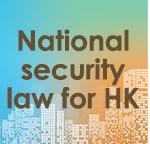Without the National Security Law for Hong Kong, the special administrative region would be sitting on a “three-legged chair”, unstable and imbalanced, according to a webinar of civil experts and political leaders on Friday.
The Basic Law and the concept of the “one country, two systems” principle would be imperfect if the city had no relevant laws to safeguard national security, they said.
The promulgation of the National Security Law for Hong Kong is an important milestone of ‘one country, two systems’, and it put the derailed city back on track
Erick Tsang Kwok-wai, secretary for Constitutional and mainland affairs
The remarks were made in a webinar held by Hong Kong-based think tank Savantas Policy Institute, with the theme “Basic Law Development and Outlook”.
Johnny Mok Shiu-luen, a barrister and member of the Basic Law Committee of the Hong Kong Special Administrative Region, in his speech underlined the significance of the Basic Law, saying it is a blueprint for the city’s stability and prosperity, and protects Hong Kong residents’ rights and freedom.
However, as an important part of the city’s constitutional document, the city has failed to legislate on its own to safeguard national security, as required under Article 23 of the Basic Law, Mok said.
According to Article 23 of the Basic Law, the Hong Kong Special Administrative Region shall enact laws on its own to prohibit any act of treason, secession, sedition, and subversion against the Central People’s Government, or theft of State secrets; prohibit foreign political organizations or bodies from conducting political activities in the region; and to prohibit political organizations or bodies of the region from establishing ties with foreign political organizations or bodies.
“Even though Hong Kong has a well-established financial system and judiciary system, it would still be like sitting on a three-legged chair, unstable, if the laws to safeguard the national security cannot be enacted and implemented,” Mok said.
“Under the circumstances (without the National Security Law), Hong Kong seems stable when others don’t push you. Once someone attempts to push you, you will fall down,” he added.
Mok was referring to the four foundations serving as “four legs” for the “one country, two systems” policy: founding the HKSAR; promulgating the Basic Law; implementing the Basic Law; and enacting laws to prevent all acts that endanger the national security.
All four legs are indispensable if “one country, two systems” is to ensure a steady implementation, he said.
Also addressing the event was Secretary for Constitutional and Mainland Affairs Erick Tsang Kwok-wai, who said the promulgation of the National Security Law for Hong Kong is an important milestone of “one country, two systems”, and it put the derailed city back on track.
Noting the concept of “one country, two systems” was initially put forward to safeguard the nation’s sovereignty, unity and territorial integrity, Tsang said the city’s newly enacted National Security Law is completely in line with the concept.
Tsang said Hong Kong cannot succeed without the central government’s support and the implementation of the Basic Law and the “one country, two systems” principle. He urged residents to cherish the city’s unique advantages.
Albert Chen Hung-yee, a member of the Basic Law Committee and professor of the Department of Law at the University of Hong Kong, said Basic Law education is a crucial part of the city’s civic education.
The legal scholar said he believes civic education should be provided on campus starting at a young age, with primary or secondary school students.
He suggested the civic education include not only what the Constitution and Basic Law are, but include other concrete laws, such as criminal law, and why the city needs the laws, and the nation’s development.
Regina Ip Lau Suk-yee, a lawmaker and the city’s former security chief, said she hopes there will be more interactive activities, such as themed seminars, organized for the city’s young people.



